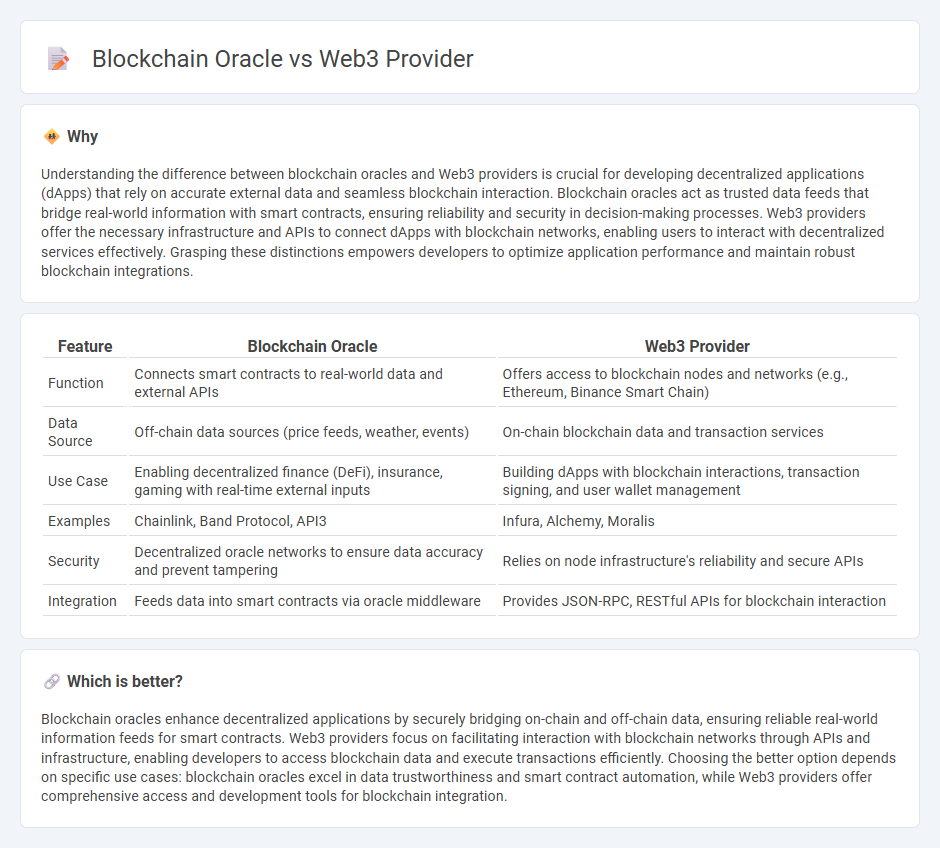
Blockchain oracles serve as critical bridges connecting decentralized blockchain networks with real-world data, enabling smart contracts to execute based on external information. Web3 providers offer the infrastructure and APIs that facilitate user interactions with decentralized applications, supporting blockchain data retrieval and transaction management. Explore further to understand how these components uniquely empower the decentralized ecosystem.
Why it is important
Understanding the difference between blockchain oracles and Web3 providers is crucial for developing decentralized applications (dApps) that rely on accurate external data and seamless blockchain interaction. Blockchain oracles act as trusted data feeds that bridge real-world information with smart contracts, ensuring reliability and security in decision-making processes. Web3 providers offer the necessary infrastructure and APIs to connect dApps with blockchain networks, enabling users to interact with decentralized services effectively. Grasping these distinctions empowers developers to optimize application performance and maintain robust blockchain integrations.
Comparison Table
| Feature | Blockchain Oracle | Web3 Provider |
|---|---|---|
| Function | Connects smart contracts to real-world data and external APIs | Offers access to blockchain nodes and networks (e.g., Ethereum, Binance Smart Chain) |
| Data Source | Off-chain data sources (price feeds, weather, events) | On-chain blockchain data and transaction services |
| Use Case | Enabling decentralized finance (DeFi), insurance, gaming with real-time external inputs | Building dApps with blockchain interactions, transaction signing, and user wallet management |
| Examples | Chainlink, Band Protocol, API3 | Infura, Alchemy, Moralis |
| Security | Decentralized oracle networks to ensure data accuracy and prevent tampering | Relies on node infrastructure's reliability and secure APIs |
| Integration | Feeds data into smart contracts via oracle middleware | Provides JSON-RPC, RESTful APIs for blockchain interaction |
Which is better?
Blockchain oracles enhance decentralized applications by securely bridging on-chain and off-chain data, ensuring reliable real-world information feeds for smart contracts. Web3 providers focus on facilitating interaction with blockchain networks through APIs and infrastructure, enabling developers to access blockchain data and execute transactions efficiently. Choosing the better option depends on specific use cases: blockchain oracles excel in data trustworthiness and smart contract automation, while Web3 providers offer comprehensive access and development tools for blockchain integration.
Connection
Blockchain oracles serve as trusted data bridges that supply external information to smart contracts within Web3 environments, enabling decentralized applications to interact with real-world events and data. Web3 providers facilitate user access to blockchain networks and decentralized services by integrating oracle data, ensuring seamless execution of smart contracts with accurate off-chain inputs. This connection enhances the functionality and reliability of decentralized finance (DeFi), NFT platforms, and other Web3 innovations by linking real-world data with on-chain logic.
Key Terms
Decentralization
Web3 providers act as gateways connecting users to decentralized blockchain networks, ensuring peer-to-peer interaction without centralized intermediaries. Blockchain oracles enable smart contracts to interact with off-chain data sources while maintaining trust through decentralized consensus mechanisms. Discover how decentralization shapes the reliability and security of these critical Web3 components.
Data Access
Web3 providers facilitate direct interaction with blockchain networks by offering APIs and node access, enabling decentralized applications to read and write data on-chain. Blockchain oracles serve as trusted intermediaries that fetch and verify off-chain data from external sources, ensuring the integrity and reliability of input for smart contracts. Discover how these components complement each other to enhance blockchain data accessibility and functionality.
Trust Layer
Web3 providers enable decentralized applications to interact with blockchain networks by supplying access to nodes and managing user authentication, forming the essential trust layer for secure blockchain connectivity. Blockchain oracles bridge on-chain smart contracts with off-chain data, ensuring reliable and tamper-proof information that enhances decision-making processes beyond native blockchain data. Explore the nuanced differences and their roles in establishing a robust trust layer in decentralized ecosystems.
Source and External Links
What are Web3.js Providers [Explained] - Metana - Web3.js providers enable dApps to interact with the Ethereum blockchain by connecting through HTTP, IPC, or third-party services like Infura or Alchemy that simplify development and scaling of decentralized applications.
Web3.js Providers Overview - Providers in Web3.js are essential services that connect your application to Ethereum nodes, allowing querying, transactions, and smart contract interactions by supplying a provider when creating a Web3 instance.
MetaMask - Web3 - Casdoor - MetaMask acts as a popular Web3 provider that serves as a crypto wallet and a gateway for blockchain applications, enabling Web3 login and interaction by integrating it as a provider in your app.
 dowidth.com
dowidth.com